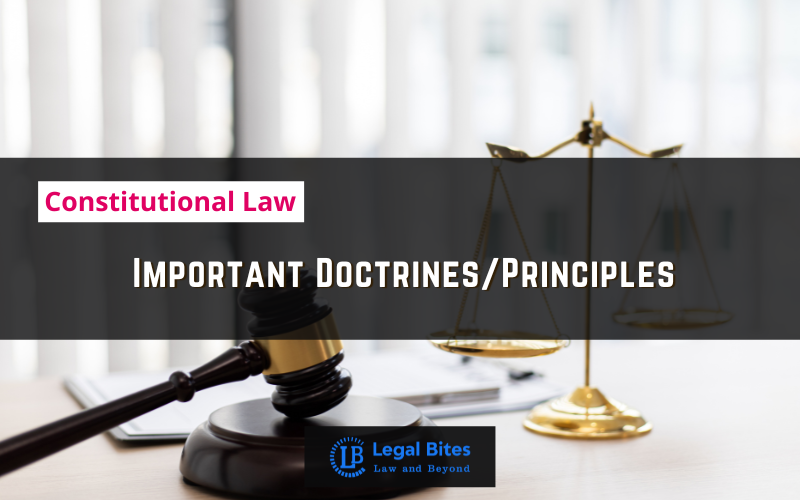The State Government passed an order of compulsory retirement stating that the employee is not fit for work. Does the order amount to punishment or not? Give reasons for your answer with the help of decided cases.
Question: The State Government passed an order of compulsory retirement stating that the employee is not fit for work. Does the order amount to punishment or not? Give reasons for your answer with the help of decided cases. [UPJS 2013] Find the answer to the mains question only on Legal Bites. [The State Government passed an order of… Read More »
;
Question: The State Government passed an order of compulsory retirement stating that the employee is not fit for work. Does the order amount to punishment or not? Give reasons for your answer with the help of decided cases. [UPJS 2013] Find the answer to the mains question only on Legal Bites. [The State Government passed an order of compulsory retirement stating that the employee is not fit for work. Does the order amount to punishment or not? Give reasons for your answer with the help...
Question: The State Government passed an order of compulsory retirement stating that the employee is not fit for work. Does the order amount to punishment or not? Give reasons for your answer with the help of decided cases. [UPJS 2013]
Find the answer to the mains question only on Legal Bites. [The State Government passed an order of compulsory retirement stating that the employee is not fit for work. Does the order amount to punishment or not? Give reasons for your answer with the help of decided cases.]
Answer:
Article 311 of the constitution accords protection to Civil servants and the Services. Article 311 (1) says that no government employee either of an all-India service or a state government shall be dismissed or removed by an authority subordinate to the owner that appointed him/her.
Article 311 (2) says that no civil servant shall be dismissed or removed or reduced in rank except after an inquiry in which s/he has been informed of the charges and given a reasonable opportunity of being heard in respect of those charges.
The most notable point is that Article 311 is available only in cases of dismissal, removal, reduction in rank by way of punishment. Thus, it is difficult to determine when an order of termination of service or reduction in rank amounts to punishment. The extent of protection under the provision implies that Article 311 cannot be invoked in cases of compulsory retirement in the public interest.
Compulsory retirement simpliciter is not punishment. It is done in ‘public interest and does not cast a stigma on the Government servant. So the employee cannot claim an opportunity to be heard before he is compulsorily retired from service. In Baikunth Das v. Chief Medical Officer [(1992) 2 SCC 299] SC has was held that the matter of compulsory retirement is on the basis of subjective satisfaction and not on the basis of any behaviour. The proceedings are also not quasi-judicial and hence the principles of natural justice are not attracted.
The Supreme Court of India has issued certain guidelines regarding compulsory retirement. In-State of Gujarat v. Umedbhai M. Patel [AIR 2001 SC 1109], the Court laid down the following principles:
- When the Service of a public servant is no longer useful to the general administration, the officer can be compulsorily retired in the public interest.
- Ordinarily, the order of compulsory retirement is not to be treated as a punishment under Article 311 of the Constitution.
- For better administration, it is necessary to chop off dead wood but the order of compulsory retirement can be based after having due regard to the entire service record of the officer.
- Any adverse entries made in the confidential record shall be taken note of and be given due weightage in passing such order.
- The order of compulsory retirement shall not be passed as a shortcut to avoid departmental inquiry when such a course is more desirable.
- If the officer is given a promotion despite adverse entries in the C. R., that is a fact favor of the officer.
- Compulsory retirement shall not be imposed as a punitive measure.
Important Mains Questions Series for Judiciary, APO & University Exams
- Constitutional Law Mains Questions Series Part-I
- Constitutional Law Mains Questions Series Part-I
- Constitutional Law Mains Questions Series Part-II
- Constitutional Law Mains Questions Series Part-IV
- Constitutional Law Mains Questions Series Part-V
- Constitutional Law Mains Questions Series Part-VI
- Constitutional Law Mains Questions Series Part-VII
- Constitutional Law Mains Questions Series Part-VIII
- Constitutional Law Mains Questions Series Part-IX
- Constitutional Law Mains Questions Series Part-X



